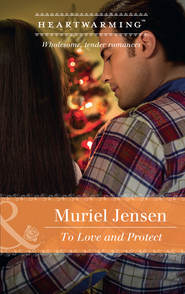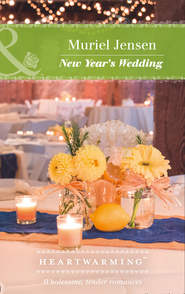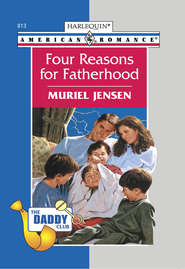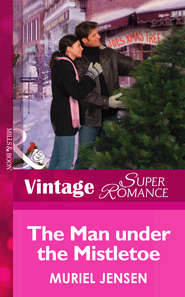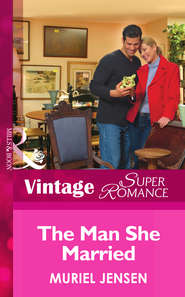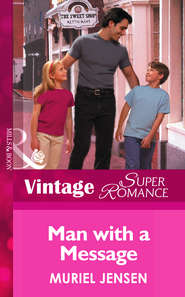По всем вопросам обращайтесь на: info@litportal.ru
(©) 2003-2024.
✖
Man In A Million
Автор
Год написания книги
2019
Настройки чтения
Размер шрифта
Высота строк
Поля
“She was beautiful and I was…more cerebral. I hated her because every boy who came to our home noticed her and not me, and she hated me because I got the grades and she was always having to explain to our parents why hers were so low.”
“That’s just the usual kid stuff, isn’t it?”
“It would be,” she said, sounding distracted, “if the father we both adored growing up hadn’t turned out to be her father, but not mine.”
“That’s what you were thinking about this morning,” he guessed, “when you didn’t see the oncoming car.”
She nodded regretfully, then folded her arms, clearly upset with herself that she’d shared that. “I can’t believe I didn’t see that car. Well, I must have seen it, but somehow it just didn’t register.”
“I’m sure discovering that your parent isn’t really your parent is pretty heavy stuff. You just found out?”
She told him how she accidentally learned in a college class that her father could not be hers biologically. About coming back to Maple Hill to confront her mother, who seemed to have explained away the situation with a series of lies.
“My mother left for a photo shoot in Africa a few days ago,” Paris said. “And I determined that while she was gone, I was going to find out for myself who my father was.”
“But…you said she told you he was dead.”
“Yes, but she lied. Well, at least the man whose name she gave me is very much alive. And he denies being my father.”
“He could be lying, too.”
“I don’t think so.”
“Then…I guess you have to somehow convince your mother that you can take the truth.”
“Take the truth.” She leaned back against the headrest. “Why would she think I can’t take it? Certainly she wouldn’t be the first unwed mother, if that’s the case. Anyway, I’d just talked to Jeffrey St. John this morning—that’s the man she told me was my father—and I was a little upset and on my way to the market to buy a giant candy bar.”
“There was half of one in your wallet,” he said, turning onto Lake Road.
She made a face at him. “Prue ate it when she drove last night.”
He laughed. “You mean, she denies you but eats it herself?”
“She can,” she said. “She’s very petite. It’s that yellow house.”
She pointed to a big bungalow with a private dock and a considerable amount of lakefront. He pulled into a short driveway with yellow chrysanthemums on both sides.
Prue, wearing overalls and a broad-brimmed sun hat, was weeding the beds. She looked up in surprise, then stood as he pulled up to the rear steps.
“Isn’t she like a cover of Better Homes and Gardens magazine?” Paris asked. “Dressed in grubbies and somehow still a picture.”
He had to agree. “She’s a very attractive woman. But so are you. And while confidence is sexy, there’s something about vulnerability that’s very appealing.”
She looked at him in surprise.
“What happened?” Prue asked, putting the basket and scissors down at the sight of Paris’s pale face. Then she noticed the Berkshire Cab sign on the strange car. “Where’s the wagon?”
Paris explained briefly about the accident. “The wagon’s going to be in the shop for a couple of days, so Randy’s lending us his car.”
“That’s very kind of you.” She gave Randy a knowing look, as though suspecting his interest in her sister motivated his kindness. Then she returned her attention to Paris. “But are you okay? Have you seen a doctor?”
Paris started for the house, telling her sister about the trip to the emergency room. Then she seemed to remember him.
He was wondering if he was going to have to walk home when she studied him consideringly, then drew a deep breath. “I’m going to make him a sandwich, then you can take him home when you start your shift.”
She glanced at her watch. “I’d better start early. We have a Wednesday afternoon regular, don’t we? Two-thirty?”
Paris put a hand to her forehead and groaned. “I forgot! The Lightfoot sisters and their weekly tea party with Mariah at Perk Avenue.” The Lightfoot sisters ran the Maple Hill Manor School where Mariah once worked. “And I was congratulating myself on having picked a slow afternoon to have an accident. No calls backed up on the cell phone.”
“Not a problem.” Prue snatched the phone and whipped the sun hat off her head. “I’ll take over now, then you can call me when Randy’s ready to go home. I like it when you owe me.” Then she used her hat to point at the box in Paris’s hands. “Is that chocolate?”
Paris clutched it to her and her expression grew firm. “They were a gift from Randy when he picked me up at the hospital. You can trust me with them. We made a deal.”
Prue nodded, looking unconvinced. “All I ask is that you remember the red dress.”
“I will, I will,” Paris promised.
With a doubtful look back at her sister, and a scolding look for Randy, Prue hurried off to the house.
Paris beckoned him to follow her.
The house looked like a place occupied by three women, though it had none of the colonial or sometimes Victorian air with which many of the locals decorated their homes. It was all bright colors and floral patterns in the upholstery and the curtains, lending it a sort of patio flavor. He wondered if the women’s mother had tried to bring Southern California with her when she followed her husband here.
They walked into a living room that was painted bright red with white farm-style furniture upholstered in a slate-blue fabric covered with red-and-cream flowers. A coordinating plaid covered a fainting couch and another chair.
He heard Prue run up the stairs while Paris led the way into a huge cream-colored kitchen that looked very up-to-date. The cupboards had wire-mesh fronts, and several bottom ones were fitted with basket bins for produce. An old-fashioned iron stove attracted his attention, but upon closer inspection, he noticed that what appeared to be a wood box was really just an extension of a very large oven, and it wasn’t iron at all, just designed to appear to be. The refrigerator and the dishwasher matched with the same convex black panels and gold filigree trim.
A long work island in the middle of the room boasted a small sink on one end and stools on the far side.
This made his Spartan apartment look even more basic, and muddled his impression of Paris and her mother and sister as three women struggling to get by.
“Wow,” he said simply.
She had opened the refrigerator door and turned to peer at him in question.
He spread his arms to indicate the room. “I have a corridor kitchen that’s about eight feet long with barely room to turn around. This is very elegant.”
She nodded. “My dad was very handy,” she said, then with a quick frown, corrected herself. “You know. Jasper. Prue’s dad. My…stepdad, I guess.” Then she seemed to tire of deciding what to call him and just went on. “He loved to putter in his spare time and Mom always had an idea of how to make things more useful and more beautiful. She has a real gift for decorating.”
“I’ll say.”
“Turkey and Swiss, or ham and cheddar?” She held up deli packs of lunch meat.
He went toward her. “Is ham and Swiss out of the question?”
“Unorthodox,” she replied, selecting those from her collection, “but not out of the question. Whole wheat or sourdough?”
“Whole wheat.”






